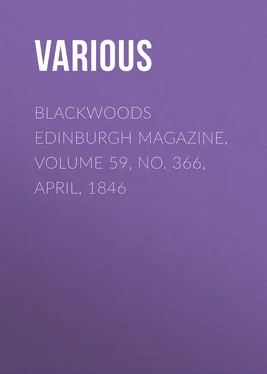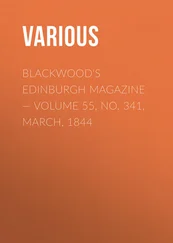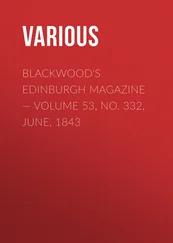Various - Blackwoods Edinburgh Magazine, Volume 59, No. 366, April, 1846
Здесь есть возможность читать онлайн «Various - Blackwoods Edinburgh Magazine, Volume 59, No. 366, April, 1846» — ознакомительный отрывок электронной книги совершенно бесплатно, а после прочтения отрывка купить полную версию. В некоторых случаях можно слушать аудио, скачать через торрент в формате fb2 и присутствует краткое содержание. Жанр: periodic, foreign_edu, Путешествия и география, на английском языке. Описание произведения, (предисловие) а так же отзывы посетителей доступны на портале библиотеки ЛибКат.
- Название:Blackwoods Edinburgh Magazine, Volume 59, No. 366, April, 1846
- Автор:
- Жанр:
- Год:неизвестен
- ISBN:нет данных
- Рейтинг книги:5 / 5. Голосов: 1
-
Избранное:Добавить в избранное
- Отзывы:
-
Ваша оценка:
- 100
- 1
- 2
- 3
- 4
- 5
Blackwoods Edinburgh Magazine, Volume 59, No. 366, April, 1846: краткое содержание, описание и аннотация
Предлагаем к чтению аннотацию, описание, краткое содержание или предисловие (зависит от того, что написал сам автор книги «Blackwoods Edinburgh Magazine, Volume 59, No. 366, April, 1846»). Если вы не нашли необходимую информацию о книге — напишите в комментариях, мы постараемся отыскать её.
Blackwoods Edinburgh Magazine, Volume 59, No. 366, April, 1846 — читать онлайн ознакомительный отрывок
Ниже представлен текст книги, разбитый по страницам. Система сохранения места последней прочитанной страницы, позволяет с удобством читать онлайн бесплатно книгу «Blackwoods Edinburgh Magazine, Volume 59, No. 366, April, 1846», без необходимости каждый раз заново искать на чём Вы остановились. Поставьте закладку, и сможете в любой момент перейти на страницу, на которой закончили чтение.
Интервал:
Закладка:
Then followed a scene, which gave reality to all those hideous declarations. The Archbishop of Paris entered the hall of the Convention, accompanied by a formal procession of his vicars, and several of the rectors of the city parishes. He there addressed the Assembly in a speech, in which he renounced the priesthood in his own name, and that of all who accompanied him, declaring that he acted thus in consequence of his conviction, that no national worship should be tolerated except the worship of Liberty and Equality! The records of the Convention state, that the archbishop and his rectors were received with universal transport, and that the archbishop was solemnly presented with a red cap, the day concluding with the worthy sequel, the declaration of one Julien, who told the Assembly that he had been a Protestant minister of Toulouse for twenty years, and that he then renounced his functions for ever. "It is glorious," said this apostate, "to make this declaration, under the auspices of reason, philosophy, and that sublime constitution which has already overturned the errors of superstition and monarchy in France, and which now prepares a similar fate for all foreign tyrannies. I declare that I will no longer enter into any other temple than the sanctuary of the laws. Thus I will acknowledge no other God than liberty, no other worship than that of my country, no other gospel than the republican constitution."
Then followed a succession of addresses and letters from the various commissioners in the departments, blaspheming in the same atrocious strain. The municipality of Paris, which was one of the chief governing powers, if not the actual ruler of France, followed this declamation by an order, that all the churches should be shut, let their denomination of worship be what it might, and that any attempt to reopen one should be punished by arrest. The decree was put into immediate effect. The church of Notre Dame and all the other churches of the capital were closed. The popular measures were now carried on in a kind of rivalry of destruction. The "Section of the Museum," a portion of the populace, announced that they had done execution on all Prayer-books, and burnt the Old and New Testaments. The Council-General of Paris decreed that a civic feast should be held in the cathedral of Notre Dame, and that a patriotic hymn should be chanted before the statue of liberty. The Goddess of Reason was personated by a Madame Momarro, a handsome woman of profligate character, who was introduced into the hall of the Convention, received with "the fraternal embrace" by the president and secretaries, and was then installed by the whole legislature in the cathedral, which was called the "Regenerated Temple of Reason." In this monstrous profanation, the apostate archbishop officiated as the high priest of Reason, with a red cap on his head, and a pike in his hand; with this weapon he struck down some of the old religious emblems of the church, and finished his performance by placing a bust of Marat on the altar. A colossal statue was then ordered to be placed "on the ruins of monarchy and religion."
This desperate profanation was emulated in the provinces. Fouché, in Lyons, ordered a civic festival in honour of one Chalier. An ass, with a mitre on its head, and dragging a Bible at its tail, formed a characteristic portion of the ceremony; the Bible was finally burnt, and its ashes scattered to the winds.
"Thus Christianity," said the noble speaker, "was stigmatized, through the president of the Convention, amid the applauses of the whole audience, as a system of murder and massacre, incapable of being tolerated by the humanity of a republican government. The Old and New Testaments were publicly burnt, as prohibited books. Nor was it to Christianity that their hatred was confined; the Jews were involved in this comprehensive plan. Their ornaments of public worship were plundered, and their vows of irreligion were recorded with enthusiasm. The existence of a future state was openly denied, and modes of burial were devised, for the express purpose of representing to the popular mind, that death was nothing more than an everlasting sleep; and, to complete the whole project, doctrines were circulated under the eye of the government, declaring that 'the existence of a Supreme God was an idea inconsistent with the liberty of man.'"
In England, we are verging on democracy from year to year. We have begun by unhinging the national respect for the religion of the Scriptures, in our zeal to introduce the religion of the Council of Trent into the constitution. The malecontents in the Established Church are contributing their efforts to bring Protestantism into contempt, by their adoption of every error and every absurdity of the Papist. The bolder portion of these malecontents have already apostatized. The Church once shaken, every great and salutary support of the constitution will follow, and we shall have a government impelled solely by faction. When that time arrives, the minister will be the mere tool of the multitude; the faction in the streets will have its mouthpiece in the faction of the legislature. Property will be at the mercy of the idle, the desperate, and the rapacious – Law will be a dead letter – Religion a mockery – Right superseded by violence – and the only title to possession will be the ruffian heart and the sanguinary hand.
We are perfectly aware, that a large portion of the country cannot be persuaded that it is necessary for them to disturb their own comfort, quiet, and apathy, for any possible reason – that they believe all change to be of too little moment to demand any resistance on their part; and that, at all events, they trust that the world will go on smoothly for their time, whatever may be the consequence of their scandalous and contemptible apathy hereafter. But, such thinkers do not deserve to have a country, nor to be protected, nor to be regarded as any thing but as the cumberers of the earth. On such men no power of persuasion can act; for no argument would convince. They wrap themselves up in their snug incredulity, leave it to others to fight for them, and will not hazard a shilling, nor give a thought, for the salvation of their country! Yet even they are no more secure than the rest. The noble, the priest, and the man of landed wealth, are not those alone on whom the heavy hand of rabble robbery will fall. We give them, on this head, a fragment from the report of the well-known Barrère, from the "Committee of Public Welfare," constituting, in fact, the rule of conduct to the Republic. It begins by declaring the "necessity of abandoning the idea of mercy in republican government." It pronounces the necessity of the law to act, for the "arrest of suspected persons." It declares every "remnant of the gentry of France to be an object of suspicion." It declares the " business of bankers to render them objects of suspicion." It declares "their reluctance to receive assignats, and their sordid attachment to their own interests ," to make all merchants objects of suspicion. It declares "all the relatives of emigrants" to be objects of suspicion. It declares "all the clergy who have refused the constitutional oath, and all the former magistracy," to be objects of suspicion. All those classes of society are to be sentenced at once, " without being heard ." Let us strike at once, says this desperate document, " without trial and without mercy . Let us banish all compassion from our bosoms. Oh! what innumerable mischiefs may be produced by a false sentiment of pity?"
This decree, which made every man a victim who had any thing to lose, instantly crowded the French prisons with the merchants, the bankers, and the whole monied class in France. Those who could be plundered no longer, were sent to execution. In Paris alone, within six months, a thousand persons of the various professions had been murdered by the guillotine. During the three years of the democracy, no less than eighteen thousand individuals, chiefly of the middle order, perished by the guillotine.
Читать дальшеИнтервал:
Закладка:
Похожие книги на «Blackwoods Edinburgh Magazine, Volume 59, No. 366, April, 1846»
Представляем Вашему вниманию похожие книги на «Blackwoods Edinburgh Magazine, Volume 59, No. 366, April, 1846» списком для выбора. Мы отобрали схожую по названию и смыслу литературу в надежде предоставить читателям больше вариантов отыскать новые, интересные, ещё непрочитанные произведения.
Обсуждение, отзывы о книге «Blackwoods Edinburgh Magazine, Volume 59, No. 366, April, 1846» и просто собственные мнения читателей. Оставьте ваши комментарии, напишите, что Вы думаете о произведении, его смысле или главных героях. Укажите что конкретно понравилось, а что нет, и почему Вы так считаете.












